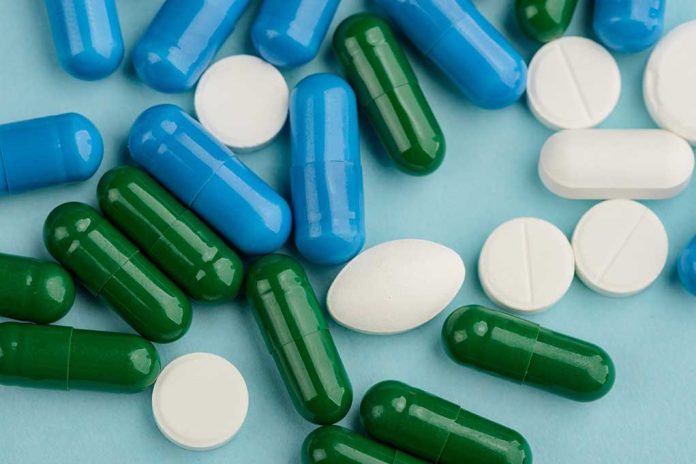🔴 Website 👉 https://u-s-news.com/
Telegram 👉 https://t.me/usnewscom_channel
In an age where public trust in the American healthcare system is plummeting, a whistleblowing pharmacist has shed light on what he believes are five “scam” medications, igniting a fiery debate on the integrity of medical practices.
At a Glance
- The CDC urges caution around ADHD stimulant medications.
- DOJ indicts two individuals for a $100 million stimulant distribution scheme via telemedicine.
- Medication shortage and illegal online pharmacies undermine patient trust in healthcare.
- Pharmacist highlights scams in popular OTC drugs.
Declining Trust in Health Care
Public skepticism of the healthcare system has surged, with only 60% expressing trust. Amidst this climate, pharmacist Grant Harting’s revelation regarding five patented medications deemed misleading increases public anxiety. This skepticism is fed by alarming findings, including the indictment of two individuals exploiting telemedicine to distribute more than 40 million stimulant pills, generating $100 million in revenue. This illegal scheme underlines the fear of unregulated telehealth practices.
The distrust extends to the alarming scarcity of ADHD medications post-2022, complicating patient care. The CDC’s advisory now warns subscribers using telehealth platforms of potential disruptions threatening the availability of legitimate medical treatments. Such measures were further catalyzed by the legal actions against fraudulent operators.
This is HUGE. For many isolated communities, local pharmacists are the only healthcare provider they’ve got — Yet PBMs like CVS are under-reimbursing them so they can buy them out or drive them into bankruptcy and force patients to use their substandard drug stores. It’s sick. https://t.co/75xqHVzM79
— Sara Sirota (@SaraLSirota) July 25, 2023
Healthcare Fraud and Abuse
The intersection of digital health growth and regulatory gaps has yielded legal crises. The DOJ’s indictment marks a precedent as the first criminal prosecution involving a digital health company accused of unlawfully distributing stimulants. According to Attorney General Merrick B. Garland, perpetrators exploited the COVID-19 pandemic to orchestrate the illegal scheme. Such opportunistic fraud highlights vulnerabilities in a rapidly evolving healthcare landscape.
“In response to the arrests, the CDC issued a Health Alert Network Advisory to avoid stigmatization and counsel on medication risks.” – Centers for Disease Control and Prevention (CDC) drugtopics.com/view/after-doj-indictment-cdc-urges-caution-around-adhd-medications
Grant Harting, a vocal advocate for transparency in medical practice, highlights over-the-counter medications deemed exploitative. He describes these products as “complete and total garbanzo-beans trash,” reflecting broader concerns about consumer manipulation. These revelations necessitate vigilance among consumers and demand accountability from pharmaceutical entities to inspire renewed trust in the healthcare system.
Future Measures and Recommendations
Rebuilding trust requires addressing underlying issues of transparency and accountability. The healthcare industry must embrace reforms that balance innovation with oversight. The CDC’s emphasis on vigilance against unlicensed sources and preventing stigma related to telehealth prescriptions echoes the broader push for ethical and accessible healthcare practices.
“According to the National Association of Boards of Pharmacy, nearly 95% of online drug sale websites operations are illegal.” – National Association of Boards of Pharmacy
A proactive approach from policymakers and healthcare providers is necessary to dismantle fraudulent networks and ensure patients receive genuine, safe, and efficient care. This commitment to reform must also bridge the gap between emerging digital models and the protective frameworks essential for patient safety and confidence.

